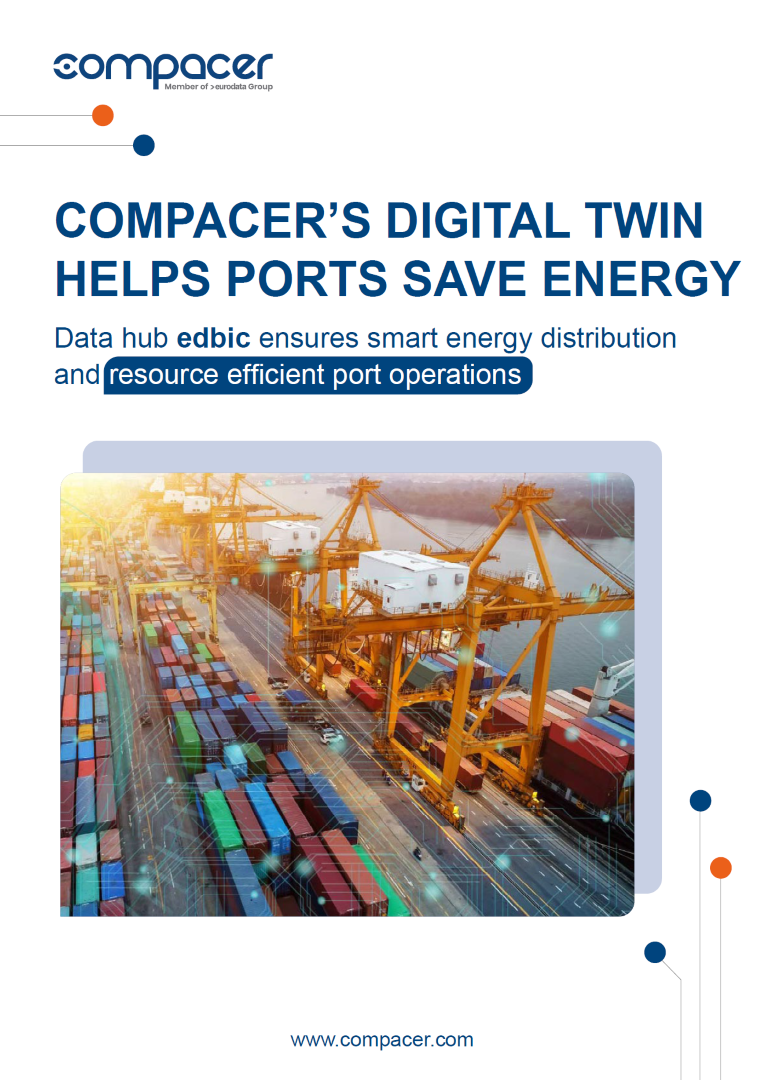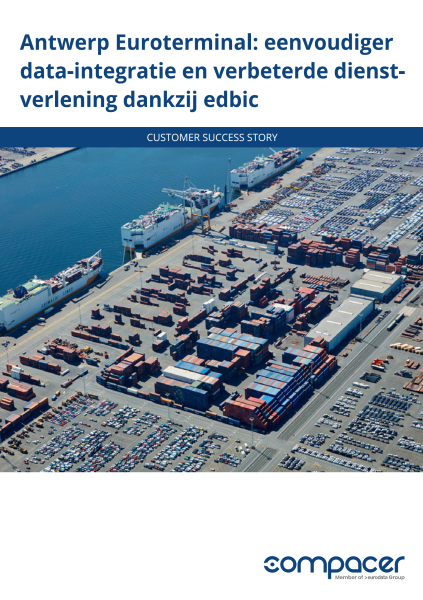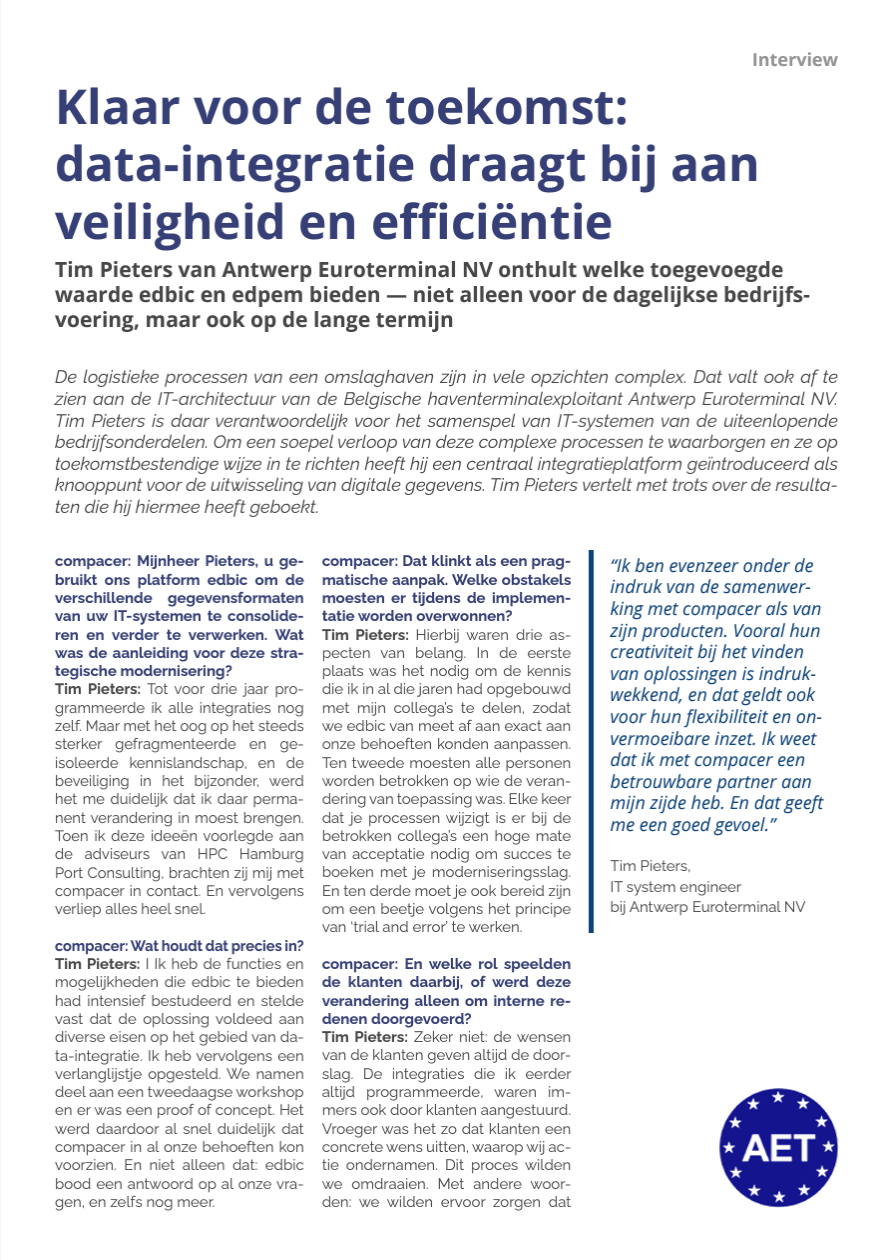De uitdaging
Naarmate de digitalisering vordert, wordt het steeds belangrijker om niet alleen de havenfaciliteiten en -machines te digitaliseren, maar ook de mensen die betrokken zijn bij het hele havenecosysteem bij dit proces te betrekken. Dit komt omdat de bedrijfsprocessen van havens zich ook snel ontwikkelen op weg naar e-business, d.w.z. papierloze digitale processen en e-commerce, met name op het gebied van e-ordering en e-betaling. Onze klant in Oekraïne stond ook voor deze uitdaging. Het bestaande Terminal Operation System (TOS) was primair gericht op het operationeel beheren van de beweging en opslag van verschillende soorten vracht in en rond de haven, maar dekte niet alle benodigde bedrijfsprocessen af en was ook niet transparant en traceerbaar voor de gehele gebruikersgemeenschap, zoals expediteurs, douaneafhandelaren, logistiek medewerkers, etc.. Beide punten zijn echter cruciaal voor de terminalactiviteiten. Al deze problemen hebben geleid tot de behoefte om de havengemeenschap te voorzien van een gebruiksvriendelijk, modern systeem. Het systeem dekt alle bestaande bedrijfsprocessen en de uitwisseling van informatie en documentatie tussen de terminal, klanten en alle andere belanghebbenden digitaal af en biedt alle gebruikers betrouwbare, transparante en gratis toegang. Het doel van onze klant was daarom om een Terminal Communication System (TCS) te introduceren dat, in combinatie met het bestaande Terminal Operation System, het ontbrekende noodzakelijke procesgerelateerde deel zou afdekken, als terminalwebshop voor klanten zou fungeren en ook alle relevante informatie voor de havengemeenschap transparant en in realtime zou verstrekken. Dit nieuwe systeem was ook bedoeld om een ander doel te bereiken, namelijk de omschakeling van papieren documentprocessen naar gedigitaliseerde processen.
De oplossing
De klant besloot het compacer edbic-platform te gebruiken als B2B-integratieplatform. Dit maakte het in de eerste stap mogelijk om alle bestaande heterogene en autonome applicatiesystemen zoals ERP, TOS en andere administratieve systemen in het havensysteemlandschap op een procesgeoriënteerde manier op één platform te integreren. In de tweede stap werd vervolgens het nieuwe Terminal Communication System (TCS) geïntegreerd in het edbic-platform. Dit nieuw gecreëerde e-business integratieplatform fungeert nu als een centrale "datahub" voor onze klant, zijn toepassingen en de hele havengemeenschap. Het zorgt voor de uitwisseling van gegevens tussen alle geïntegreerde systemen en is de kern geworden van alle operationele en logistieke stromen. Het Business Integration Cluster edbic creëert traceerbare geautomatiseerde bedrijfsprocessen met verbeterde gegevenskwaliteit door middel van centrale bewaking en rapportage, controlelogica en een breed scala aan waarschuwings- en alarmfunctionaliteiten. Dit alles helpt om de gegevenskwaliteit en transparantie binnen processen en communicatie met rederijen, douaneautoriteiten, expediteurs en andere partners van onze klanten te verbeteren en uiteindelijk ook om kosten te besparen.
Resultaat
Door het nieuwe Terminal Communication System als klantenwebportaal te koppelen aan het bestaande Terminal Operation System krijgen gebruikers nu in realtime toegang tot gedetailleerde gegevens, worden alle processen met betrekking tot de terminal transparant en ontstaat er een nauwere samenwerking tussen de havenexploitant en zijn klanten. Vragen aan de servicehotline zijn met 80% verminderd en behoren nu tot het verleden. De integriteit van de gegevens wordt onder andere gewaarborgd door wijzigingen op veldniveau goed te keuren. Dit betekent dat onze klant altijd kan zien wie welke gegevens heeft gewijzigd en wie wat mag wijzigen. - Door de administratieve systemen, de zogenaamde havenautoriteitssystemen, te koppelen aan het edbic integratieplatform werd een selfservice voor het autoriseren van het laden en lossen van vrachtwagens op het haventerrein geïmplementeerd. De nu digitale procesafhandeling voor het lossen en laden van containers op vrachtwagens van derden met behulp van een toegangspas met barcode is eenvoudiger, sneller en veel klantvriendelijker. - De integratie van Telegram Messenger was geen technische uitdaging, maar had een nog grotere impact. Dankzij deze messenger service is het nu voor alle havenmedewerkers en betrokkenen in het ecosysteem mogelijk om overal en altijd toegang te krijgen tot de gegevens van het systeem en relevante informatie te bekijken, zelfs zonder laptop. In dit project moet ook de uitstekende samenwerking met de klant en de snelle implementatie worden benadrukt. Waarom ging het zo goed? Vanaf het begin hebben onze klant en wij als compacer ons gericht op nauwe samenwerking en regelmatige feedback van de klant. Het gebruik van moderne softwareontwikkelingsframeworks en onze agile aanpak hebben ook enorm bijgedragen aan het versnellen van het project. We hebben nog steeds nauw contact en ontvangen waardevolle input en verzoeken van de klant, wat ons enorm helpt bij de interne ontwikkeling van edbic.
/Ukrainischer%20Hafen/Odessa-Hafen-Referenz.jpg)
/Ukrainischer%20Hafen/pngtree-ukraine-flag-transparent-watercolor-stroke-brush-png-image_3954405-removebg-preview.png)
/Ukrainischer%20Hafen/Odessa-Hafen-Referenz.jpg)
/Ukrainischer%20Hafen/pngtree-ukraine-flag-transparent-watercolor-stroke-brush-png-image_3954405-removebg-preview.png)
 Brochure
Brochure
 Whitepaper
Whitepaper
 Interview
Interview
/Cuxport/Screenshot%202023-11-02%20at%2012.16.02%20PM.jpg) Whitepaper
Whitepaper
/Cuxport/Screenshot%202023-11-02%20at%2012.16.09%20PM.jpg) Gegevensblad
Gegevensblad
